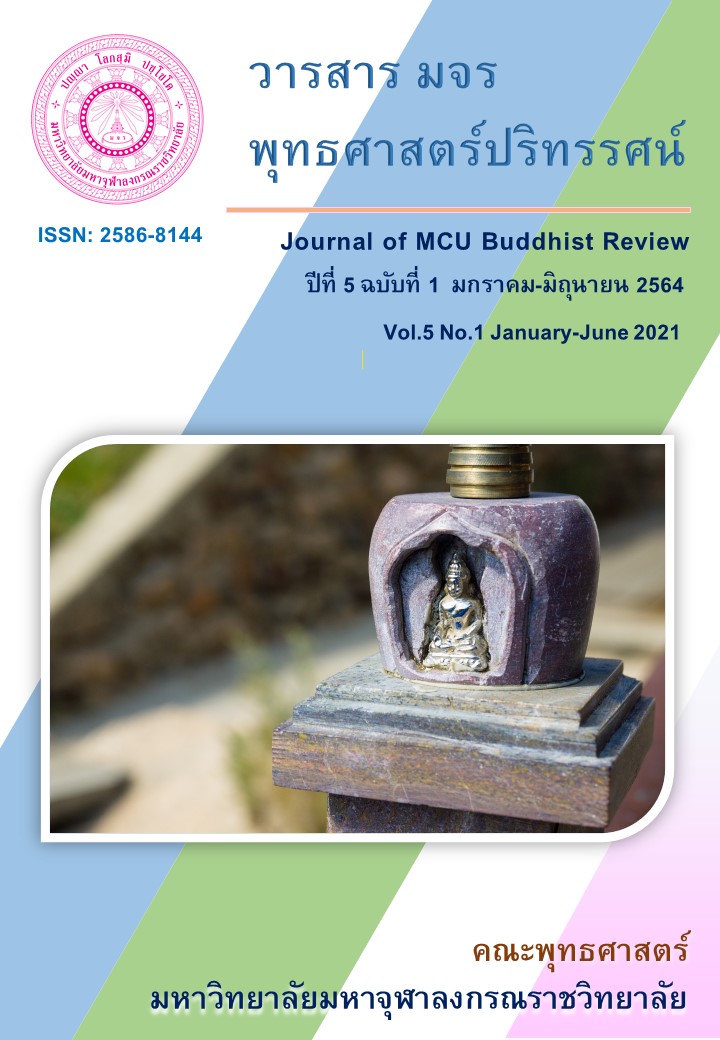ภาวะผู้นำการเปลี่ยนแปลงตามหลักปฎิจจสมุปบาท
Main Article Content
บทคัดย่อ
บทความนี้มีวัตถุประสงค์ เพื่อศึกษาแนวคิดเรื่องปฏิจจสมุปบาท และเพื่อวิเคราะห์ผู้นำการเปลี่ยนแปลงตามหลักปฎิจจสมุปบาท บทความนี้เป็นการวิจัยเชิงคุณภาพโดยการวิเคราะห์เอกสาร จากผลการศึกษาพบว่า การศึกษาภาวะผู้นำการเปลี่ยนแปลง กับพฤติกรรมมนุษย์ตามหลักปฏิจจสมุปบาท มุ่งศึกษาว่าสามารถนำมาบูรณาการและประยุกต์รูปแบบภาวะผู้นำเชิงสร้างสรรค์ยุคใหม่ได้อย่างไร ซึ่งการที่มนุษย์จะมีปฏิสัมพันธ์ที่ดีร่วมกันในทุกๆ ด้าน โดยเฉพาะการทำงานร่วมกัน ทั้งในระดับบุคคล กลุ่ม องค์การหรือสังคม คุณลักษณะของผู้นำเป็นปัจจัยที่สำคัญอย่างยิ่งที่สามารถส่งผลทั้งทางบวกและทางลบ ต่อผู้ใต้บังคับบัญชาหรือบุคคลที่เกี่ยวข้อง ภาวะผู้นำการเปลี่ยนแปลง ใน ๔ องค์ประกอบคือ การมีอิทธิพลอย่างมีอุดมการณ์ การสร้างแรงบันดาลใจ การกระตุ้นทางปัญญา และการคำนึงถึงปัจเจกบุคคล สามารถประยุกต์กับกระบวนการเรียนรู้ตามพฤติแห่งหลักปฏิจจสมุปบาท และสร้างรูปแบบเพื่อพัฒนาทักษะการเป็นผู้นำที่ส่งผลเชิงสร้างสรรค์ต่อบุคคลอื่นๆ ที่เกี่ยวข้องได้อย่างมีประสิทธิภาพ ทำให้บุคคลร่วมกันปฏิบัติหน้าที่ตามบทบาทของตนได้อย่างเต็มศักยภาพ ส่งผลให้กลุ่มและองค์การบรรลุตามแผนงานและเป้าหมายที่วางไว้ สามารถแข่งขันในโลกยุคใหม่ที่มีความเปลี่ยนแปลงตลอดเวลา ได้อย่างยั่งยืน
Article Details
- บทความที่ได้รับการตีพิมพ์เป็นลิขสิทธิ์ของวารสาร มจร พุทธศาสตร์ปริทรรศน์
- ข้อความใดๆ ที่ปรากฎในบทความที่ได้รับการตีพิมพ์ในวารสาร ถือเป็นความรับผิดชอบของผู้เขียนบทความ และข้อคิดเห็นนั้นไม่ถือว่าเป็นทัศนะและความรับผิดชอบของกองบรรณาธิการวารสาร มจร พุทธศาสตร์ปริทรรศน์
เอกสารอ้างอิง
มหาจุฬาลงกรณราชวิทยาลัย. (2539). พระไตรปิฎกภาษาบาลี ฉบับมหาจุฬาลงกรณราชวิทยาลัย. กรุงเทพมหานคร: โรงพิมพ์มหาจุฬาลงกรณราชวิทยาลัย.
มหาจุฬาลงกรณราชวิทยาลัย. (2539). พระไตรปิฎกภาษาไทยฉบับมหาจุฬาลงกรณราชวิทยาลัย. กรุงเทพมหานคร: โรงพิมพ์มหาจุฬาลงกรณราชวิทยาลัย.
เกรียงศักดิ์ เจริญวงศ์ศักดิ์. (2556). ความคิดเชิงสร้างสรรค์. พิมพ์ครั้งที่ 6. กรุงเทพฯ: บริษัท ซัคเซส มีเดีย จำกัด.
พุทธทาสภิกขุ. (2541). ปฏิจจสมุปบาทจากพระโอษฐ์. ไชยา : คณะธรรมทาน ไชยา.
นภา ธรรมทรงศนะ. (2557). บันทึกการเรียนรู้ Authentic Leadership. กรุงเทพมหานคร: มหาวิทยาลัยมหิดล
สถาบันพัฒนาพระวิทยากร. (2561). หลักสูตรผู้นำการเปลี่ยนแปลงบนรากฐานคุณธรรม จริยธรรม. กรุงเทพมหานคร: เชน ปริ้นติ้ง.
อารี พันธ์มณี. (2543). การพัฒนาความคิดสร้างสรรค์สู่ความเป็นเลิศ. กรุงเทพฯ : ภาควิชาการแนะแนวและจิตวิทยาการศึกษา คณะศึกษาศาสตร์ มหาวิทยาลัยศรีนครินทรวิโรฒ ประสานมิตร.
Baron. (1992). Behavior in Organization. Boston: Allyn and Bacon.
Bass and Avolio (1998). Transformational leadership and the falling dominos effect Group and Organization studies. Group & Organization Studies. Volume: 12 issues: 1, page(s): 73-87.
Jones, Gareth R., & George, Jennifer M. (2003). Contemporary Management. 3rd ed. New Jersey: McGraw-Hill.
Middlemist and Hiitl. (1983). Personnel Management: Jobs, People and Logic. New Jersey: Prentice-Hall.


